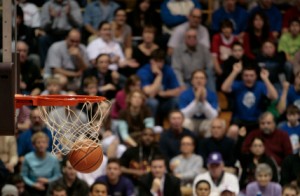College Sports Programs – Of Memphis, John Calipari, and Why the Model Must Change
Generally speaking, I love attending college sporting events. The atmosphere can be electric and the games certainly provide an opportunity for students to get a little rowdy with friends.
In sum total they can serve as a much needed-alternative to the stress of papers and tests.
But unfortunately, the college athletic model has succumbed to the same pressure that drives the professional sports world: money. The quest for the almighty dollar can lead to shameful behaviors, greed being what it is, and to situations like the recent one involving the Memphis men’s basketball program.
 At the same time, the Memphis situation reveals the perverse world of college athletics, one where the two people most responsible for a problem, the student-athlete and the coach, somehow manage to earn greater sums after the incident, while the people least responsible, the player’s teammates, become victims of the greedy system.
At the same time, the Memphis situation reveals the perverse world of college athletics, one where the two people most responsible for a problem, the student-athlete and the coach, somehow manage to earn greater sums after the incident, while the people least responsible, the player’s teammates, become victims of the greedy system.
Using an Improper Player
Under the current model, college coaches recruit gifted players, many who would not academically qualify for admission if not for their athletic talents. Even the best schools today adjust their admission standards so as to be able to compete in the financially lucrative world of college athletics.
The recent Memphis situation involved the immensely talented Derek Rose (in what amounts to the biggest sham going, Rose is not actually named as the culprit), a young man who had failed to reach the minimal ACT score for college eligibility during his first three efforts. Given that a college scholarship was on the line and a new professional basketball policy that prevented teams from drafting players directly out of high school, Mr. Rose apparently engaged a surrogate student to take and pass the SAT test.
As but one sign that the coach recruiting Derek Rose might think something was amiss, Rose lived in Chicago. But the passing SAT score was obtained in Detroit, some 283 miles from Rose’s home city.
That did not deter John Calipari from signing the marginal student. Thus, for the second time in Coach John Calipari’s career he took a team to college basketball’s biggest stage, the Final Four, using an ineligible player.
In both cases, the issues were revealed after the fact, and as a result the governing body of college athletics, the NCAA, expunged the team performances from the record books. In the case of Memphis, the team’s 38 wins were forfeited and the Tigers name removed from being a final four participant.
Rich Get Richer
While the school and the other players who were part of the team have seen their performance vacated, Rose and Calipari have simply shrugged their shoulders and moved on to mounds of cash. Rose of course became a first round pick of the NBA after his one tainted season at Memphis. The rookie earned a little more than $5 million in his first season with the Chicago Bulls.
Meanwhile Calipari has managed to secure a brand new position in Lexington where he will coach another legendary basketball program, the Kentucky Wildcats. His salary comes in just under that of Rose, in the four-million dollar a year range.
A few outside Kentucky have asked a rather simple question: was Calipari in a position to know better? One would think the answer was yes, that a prudent person would have had significant doubts about how Rose managed to pass his exam.
But the money involved in high-profile college athletics tends to make some coaches hesitate. In this case, Calipari did more than hesitate, he ignored the obvious.
 In essence, it would also seem the NCAA felt likewise. Why else would it eventually rule that Memphis had to vacate its entire season including their Final Four Appearance?
In essence, it would also seem the NCAA felt likewise. Why else would it eventually rule that Memphis had to vacate its entire season including their Final Four Appearance?
But in yet another head-scratcher, a sign of all that is wrong, the folks who hired Calipari at Kentucky continue to stand by their choice despite the developments at Memphis. They insist that Calipari was not responsible for the issues related to Rose.
Indirectly, they also are conveniently ignoring that Calipari is now the only college coach in history to have two Final Four teams stripped of their accomplishments by the NCAA.
A Model Governed by Money
As with all legal cases that have huge financial ramifications, the ruling is being appealed by Memphis. Pending that appeal, Calipari has indicated he will not discuss the issue.
But he will start coaching at Kentucky irrespective of that appeal. That certainly has the folks at Kentucky hoping that what “happened in Memphis will stay in Memphis.” But as one more sign as to the flaws in the current model, consider the incentives, above and beyond the $4 million base salary, that Kentucky has placed in the Calipari contract:
- Reaching the NCAA Sweet Sixteen ($100,000).
- Reaching the Final Four ($175,000).
- Winning the NCAA title ($375,000).
College sports and money – how the model must change.

